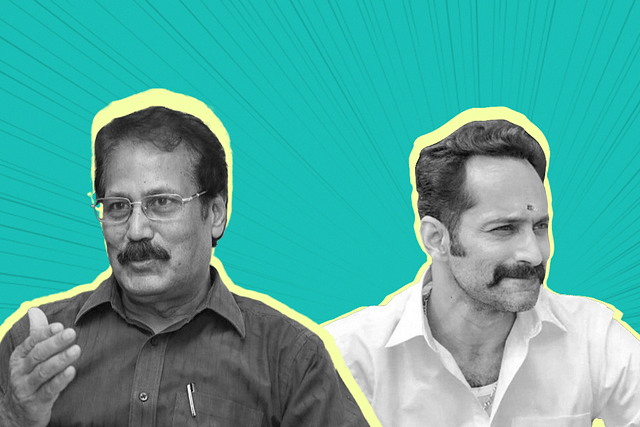Politics
Dr Krishnasamy's Message For Fahadh Faasil: Why This Tamil Politician's Appeal To A Film Star Is Being Appreciated
- Against the backdrop of caste chauvinism, Dr Krishnasamy's video is being seen as a timely message that appeals for social harmony and justice beyond identity politics.

Dr Krishnasamy (left) and Fahadh Faasil
The movie Mammannan (2023) released by 'Red Giant' has become embroiled in a caste controversy.
The film, directed by Mari Selvaraj, reportedly takes a minor character perceived as marginalized from the caste-based movie Thevar Magan (1992) and expands on the theme of villainous caste arrogance and democratic social justice.
The cast includes renowned actor Vadivelu, actor-politician Udayanidhi Stalin from the DMK dynasty, and the accomplished actor Fahadh Faasil.
In Mammannan, Faasil portrays an arrogant and violent casteist character, although his specific caste identity is not revealed in the movie.
Unfortunately, in social media, caste-chauvinists from various feudal castes have started sharing videos showcasing Faasil's character as if they are proud of the villainous and violent portrayal.
In 1992, a song from Thevar Magan similarly became a symbol of caste dominance, leading to numerous caste conflicts and loss of life.
Today, numerous misguided youths from certain dominant so-called 'upper caste' communities are sharing video clips from the movies featuring Faasil, accompanied by pro-caste songs in the background.
This trend is rekindling old wounds and undermining the efforts towards creating social harmony among different communities.
It is in such a situation Dr. Krishnasamy, the leader of the Puthiya Tamilagam party, has made a video-appeal on social media, addressing both those who create such videos and actor Faasil.
Dr Krishnasamy has pointed out that such movies centring around caste and caste-conflicts have done no good to the communities involved.
These movies have solely benefited corporate film producers and politicians who exploit "divide and rule" strategies and gain glory through the film industry. And social media users from specific communities who create videos associating themselves with the "upper-caste" character, actually demean both themselves and their communities.
In the 1990s, the emergence of such movies played a definite role in aggravating some of the most severe caste conflicts and violent incidents resulting in loss of lives on both sides. However, with time, the wounds started to heal.
Unfortunately, some vested interests are now attempting to reopen these wounds and take pleasure in caste supremacy by openly associating with the villainous characters.
This troubling trend on social media, if left unchecked, could escalate from the digital world to real-life, potentially triggering further violence.
We need to learn lessons from the past while forgetting the bitterness and move forward in peace, justice and harmony as Tamils, Hindus and Indians, said Dr Krishnasamy. Caste supremacism and identity politics are things of past and injurious to the collective welfare of Tamil Hindu society, he pointed out in the video.
This will ultimately serve the vested interests who want only their monetary and political gains, he emphasized in the video.
Dr. Krishnasamy requested Faasil to step forward and make an appeal for the removal of all memes, videos, and other content that use his role in the movie to promote caste chauvinism. He also urged Faasil to take necessary action to ensure these materials are taken down.
This timely message has been appreciated across communities and political parties who seek peace, harmony and justice among the various communities of Tamil Nadu.
Support Swarajya's 50 Ground Reports Project & Sponsor A Story
Every general election Swarajya does a 50 ground reports project.
Aimed only at serious readers and those who appreciate the nuances of political undercurrents, the project provides a sense of India's electoral landscape. As you know, these reports are produced after considerable investment of travel, time and effort on the ground.
This time too we've kicked off the project in style and have covered over 30 constituencies already. If you're someone who appreciates such work and have enjoyed our coverage please consider sponsoring a ground report for just Rs 2999 to Rs 19,999 - it goes a long way in helping us produce more quality reportage.
You can also back this project by becoming a subscriber for as little as Rs 999 - so do click on this links and choose a plan that suits you and back us.
Click below to contribute.
Latest